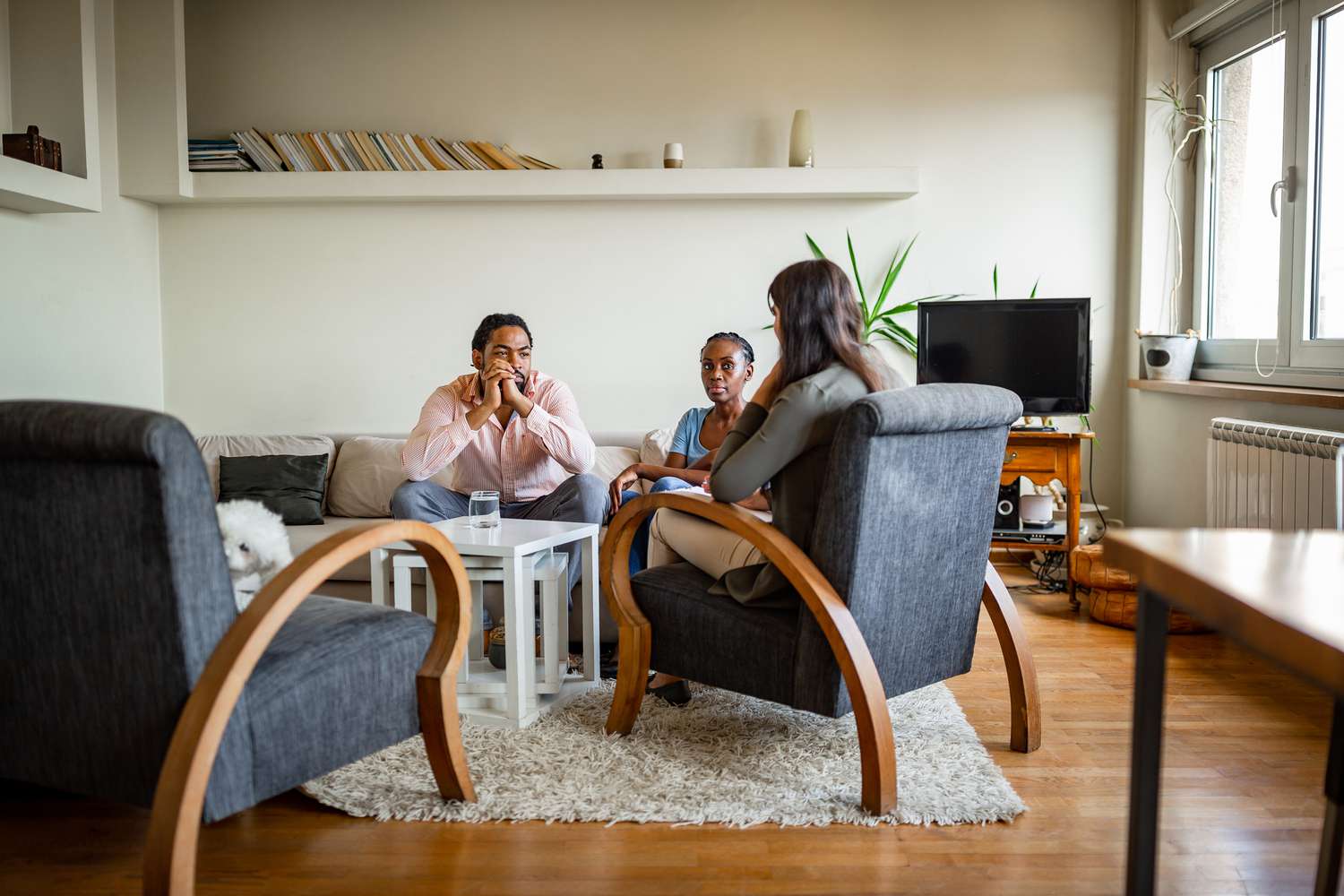Marriage can be a beautiful union, but it also comes with its challenges.
In my journey, I have faced communication issues, trust issues, and conflicting values with my partner. Feeling lost and unsure of how to move forward, I made the difficult decision to seek professional help.
Despite the stigma surrounding therapy, I realized the importance of gaining an outside perspective.
After being referred to Norfolk County Counselling and Psychotherapy (located in Simcoe, Ontario) by a friend, I leaped and began my journey towards healing.
Through open and honest communication, I could address root issues and learn healthy communication techniques. The results have been transformative – my marriage has seen improved communication, rebuilding trust, and a newfound alignment of values and goals.
Join me as I share my experience with the impact psychotherapy had on my marriage.
My Marriage Problems
Amid my relationship woes, I found myself grappling with various marriage problems including communication issues, trust and infidelity concerns, as well as differing values and goals.
One memorable instance was when we attended a couples’ therapy session to address our communication issues. It was a vulnerable yet cathartic experience, where we bared our souls and learned to truly listen to each other.
Dealing with trust and infidelity concerns brought about emotional turmoil that shook the foundations of our relationship. Navigating through feelings of betrayal and hurt taught us the importance of forgiveness and rebuilding broken trust.
Our clash of differing values and goals highlighted the need for compromise and understanding. Understanding each other’s aspirations and finding a common ground became our journey towards a stronger and more unified bond.

Communication Issues
Communication issues in a marriage can lead to misunderstandings, conflicts, and emotional distance, making it essential to seek the guidance of a therapist to navigate through these challenges.
These breakdowns can arise from differences in communication styles, where one partner may prefer direct communication while the other leans towards indirect cues.
This disparity can create confusion and frustration, impacting the emotional connection and intimacy within the relationship.
Unresolved conflicts can simmer beneath the surface, leading to resentment and further deterioration of the bond between partners.
Therapy plays a crucial role in breaking down these barriers by providing a safe space for open dialogue, improving communication skills, and fostering understanding and empathy between spouses.
Trust and Infidelity
Trust issues and the specter of infidelity can deeply strain a marriage, requiring a commitment to therapy and rebuilding emotional wellbeing to heal from these wounds.
When trust is broken in a relationship, it can shake the very foundation of intimacy and vulnerability shared between partners. I remember a friend who confided in me about how discovering their partner’s infidelity shattered their sense of security and self-worth.
The constant doubts and suspicions that followed made it challenging for them to fully invest emotionally in the relationship again.
Therapy played a crucial role in helping them navigate through the tumultuous emotions and uncertainties. Through counseling sessions, they were able to confront their fears, rebuild trust, and gradually restore the bond they once had with their partner.

Different Values and Goals
Misaligned values and goals within a marriage can lead to significant rifts and conflicts, emphasizing the need for therapy to navigate through the complexities of family dynamics and the therapy process.
When individuals in a relationship have different core beliefs or aspirations, it can create a sense of disconnect and frustration. This divergence may manifest in various aspects of daily life, from decisions about finances to raising children.
The clash of values and goals not only affects the couple directly but also has a ripple effect on the entire family unit.
Therapy plays a crucial role in helping couples explore these differences constructively, fostering open communication and mutual understanding. By diving into the root causes of discord and addressing individual perspectives, therapists assist in bridging the gap and finding common ground.
Deciding to Seek Professional Help
After much contemplation, I made the courageous decision to seek professional help, overcoming the stigma surrounding therapy and recognizing the value of an outside perspective in navigating the complexities of mental health and relationship challenges.
It was not an easy choice to acknowledge that I needed assistance, as society often portrays seeking therapy as a sign of weakness or failure. I came to understand that taking care of my mental well-being was an act of courage, not surrender.
Through the guidance of a therapist, I learned to confront my inner struggles and rebuild healthier patterns of thinking and behavior.

The Stigma Surrounding Therapy
The stigma surrounding therapy can create barriers to seeking help, but understanding that therapy is a tool for improving mental health and processing emotions is crucial in overcoming these societal challenges.
Therapy is often wrongly perceived as a sign of weakness or failure, leading many to avoid seeking the support they need. This can result in prolonged suffering and difficulties in managing mental health issues.
Therapy provides a safe and supportive environment for individuals to explore their thoughts and feelings, gain valuable insights, and develop coping strategies.
By confronting the negative perceptions of therapy, individuals can break free from the constraints imposed by stigma and embrace the healing potential of therapeutic interventions.
Through therapy, individuals can cultivate self-awareness, build resilience, and foster healthy emotional processing, leading to profound personal growth and improved overall well-being.
Realizing the Need for Outside Perspective
Realizing the need for an outside perspective through therapy was a pivotal moment in acknowledging the depth of our relationship problems and prioritizing emotional wellbeing in our journey towards healing.
Therapy provided a safe space where unsaid emotions could find their voice, allowing us to unravel tangled feelings and unspoken concerns.
Through the guidance of a skilled therapist, we navigated intricate dynamics, exploring vulnerabilities and strengths uncharted before. The introspective journey not only honed our communication skills but also fostered deeper empathy and understanding within our relationship.
By peeling back layers with expert guidance, we unearthed patterns and triggers that shaped our interactions, shedding light on deep-seated roots of conflict and discord.
This newfound awareness give the power toed us to proactively address underlying issues, paving the way for healthier and more authentic connections moving forward.

Choosing Norfolk County Counselling and Psychotherapy
Guided by a trusted friend’s referral, I embarked on the journey of choosing Norfolk County Counselling and Psychotherapy, undertaking thorough research and reading reviews to ensure a comfortable fit with the therapist.
After carefully considering my friend’s recommendation, I delved into online platforms to explore the profiles of therapists within Norfolk County Counselling and Psychotherapy.
It was essential to review their specializations, qualifications, and approaches to therapy to match my individual needs. By examining the feedback from previous clients on various platforms, I gained insights into the therapists’ efficacy and interpersonal skills.
Feeling confident in my preliminary research, I further engaged in direct communication with the therapy providers. It was crucial to assess their communication style, empathy, and willingness to tailor the treatment to my specific concerns.
Ultimately, the goal was to establish a connection and rapport that would facilitate a productive therapeutic journey.
Referral from a Friend
A referral from a close friend can be a valuable endorsement when seeking therapy, ensuring a level of comfort and trust in the therapist for the upcoming therapy sessions focused on mental health.
Knowing that someone you trust has had a positive experience with a particular therapist can ease any apprehensions or doubts you may have about starting therapy.
This level of assurance can pave the way for a smoother and more open therapeutic journey, allowing you to delve deeper into your mental health concerns without reservations.

Researching and Reading Reviews
Thorough research and reading insightful reviews played a crucial role in my decision-making process, ensuring alignment with the therapist and setting expectations for effective communication in the therapy journey.
Delving into various sources and gathering information about therapists not only helped in choosing the right fit but also contributed to building a sense of trust and comfort within the therapeutic relationship.
Understanding the therapist’s approach, specialties, and client testimonials provided a glimpse into what to anticipate during sessions, fostering a smoother transition into therapy.
Setting clear expectations from the onset fostered open dialogue and transparency, laying a solid foundation for effective communication exchanges.
This proactive approach promoted a collaborative atmosphere where both parties could express needs and preferences, ultimately enhancing the overall therapeutic experience.
Feeling Comfortable with the Therapist
Establishing a sense of comfort and trust with the therapist was paramount in fostering a safe space for emotional vulnerability, commitment to the therapy process, and building a foundation for effective communication.
When a client feels comfortable with the therapist, it allows them to open up and share their deepest feelings and thoughts without fear of judgment or rejection. This emotional connection plays a crucial role in establishing trust and commitment to the therapeutic journey.
Effective communication between the therapist and the client is the cornerstone of successful therapy sessions. It involves not only verbal expression but also active listening, empathy, and understanding.
By creating a supportive environment where the client feels heard and understood, the therapist paves the way for meaningful breakthroughs and transformative growth.”

My Experience with Psychotherapy
Embarking on one’s journey with psychotherapy, they discover the power of open and honest communication in uncovering root issues and cultivating healthy communication techniques essential for healing and growth.
In my sessions, I realized that being vulnerable and expressing feelings openly is not always easy, but it’s a crucial step towards understanding oneself better. Through introspective conversations, the therapist guided me to identify patterns, triggers, and beliefs that were influencing my behavior and emotional well-being.
This process of self-discovery and awareness allowed me to confront deep-seated fears and insecurities that I had been ignoring for years. By engaging in meaningful dialogues, I gradually learned to communicate my needs and emotions effectively without fear of judgment.
Open and Honest Communication
Creating a space for open and honest communication with the therapist allowed for the exploration of deep-rooted issues, unveiling underlying emotions, and kickstarting the therapy process towards healing.
Open communication in therapy sessions plays a crucial role in building trust and rapport between the client and therapist. By fostering an environment where thoughts and feelings can flow freely, individuals feel give the power toed to examine their vulnerabilities and confront their fears.
This process of introspection often leads to a profound understanding of the root causes of emotional distress, enabling the individual to work through past traumas and develop healthier coping mechanisms.
Through continuous dialogues and revelations, the therapeutic journey unfolds, guiding the client towards self-discovery and emotional growth.

Identifying and Addressing Root Issues
Delving into the depths of our relationship, identifying and addressing root issues became a foundational aspect of the therapy process, leading to improvements in both emotional and physical wellbeing.
By shedding light on these underlying factors, we were able to cultivate a deeper understanding of our behaviors and thought patterns. This self-awareness paved the way for self-growth and healing, resulting in a more balanced and fulfilling life.
The therapist played a crucial role in guiding us through this journey of exploration and discovery, providing support and insights that give the power toed us to confront and conquer our inner demons.
Learning Healthy Communication Techniques
Through therapy, I gained valuable insights and tools for learning healthy communication techniques, fostering trust, and deepening commitment in our relationship, paving the way for positive change.
One essential aspect of acquiring healthy communication techniques in therapy is the ability to express thoughts and emotions clearly and openly. By practicing active listening and empathetic understanding, individuals can create a safe space for effective communication to thrive.
These skills not only enhance the quality of interactions within the relationship but also lay a solid foundation for building trust and strengthening the bond between partners. By cultivating communication skills, individuals can navigate conflicts constructively, resolve misunderstandings, and nurture mutual respect.

Results and Impact on My Marriage
The journey through psychotherapy yielded transformative results in my marriage, fostering improved communication, understanding, trust, healing from infidelity, and aligning values and goals for a harmonious future.
Therapy served as a guiding light in navigating the complexities of our relationship, opening doors to deep, heartfelt dialogue that had long been stifled. The newfound trust allowed us to delve into vulnerable conversations with grace and empathy, cementing a newfound sense of connectedness.
Through the healing process, we unearthed buried emotions, healing old wounds, and paving the way for a renewed sense of intimacy. Our shared values and aspirations found common ground, creating a solid foundation for our future endeavors.
Improved Communication and Understanding
Therapy played a pivotal role in fostering improved communication and deeper understanding within our marriage, bridging the emotional distance and enhancing our connection on a profound level.
Through therapy, there was a noticeable shift in how we communicated – our conversations became more open, honest, and filled with empathy. The walls that we had built around our emotions started to come down, allowing us to truly listen and understand each other’s perspectives.
As we delved deeper into the sessions, we realized that many of our relationship problems stemmed from miscommunication and unaddressed feelings. Therapy provided us with the tools to navigate these challenges, helping us resolve conflicts more effectively and rebuild trust.

Rebuilding Trust and Healing from Infidelity
Navigating the tumultuous waters of infidelity, therapy became a beacon of hope in rebuilding trust, fostering healing, and reaffirming our commitment to a renewed and strengthened relationship.
Through the therapist’s guidance, we embarked on a journey of introspection and communication, addressing deep-rooted issues that led to the breach of trust. The challenges we faced were daunting, as we navigated feelings of betrayal, hurt, and uncertainty.
Yet, with perseverance and a shared determination to heal, we celebrated small triumphs along the way – moments of vulnerability, empathy, and understanding that strengthened our bond.
Aligning Values and Goals for the Future
Through therapy, we navigated the complexities of aligning our values and goals, fostering a shared vision for the future, and reinforcing our commitment to building a strong foundation for our family.
Therapy allowed us to delve deep into our core beliefs and aspirations, enabling us to bridge any gaps in understanding and communication.
It helped us recognize how our individual values could complement each other and contribute to a harmonious life together.
By addressing conflicts and exploring shared dreams, we gained clarity on how to navigate challenges as a unified front.

Conclusion
The journey through therapy with Norfolk County Counselling and Psychotherapy has been instrumental in transforming my marriage, leading to significant improvements in communication, trust, and alignment of values and goals. You can visit their website here: https://norfolkcountycounselling.ca/services/
During the sessions, we explored deeper insights into our individual needs and desires, allowing us to better understand and support each other.
The therapist’s guidance helped us navigate challenges, fostering a sense of empathy and mutual respect.
Through open dialogue and active listening, we learned to express ourselves more authentically, creating a more harmonious and enriching connection.
Frequently Asked Questions (FAQs)
1. How can seeking psychotherapy help with my marriage problems?
Seeking psychotherapy can provide a safe and non-judgmental space for you and your partner to work through your marriage issues. A trained therapist can help you communicate better, understand each other’s perspectives, and develop healthier coping mechanisms for conflicts.
2. Can I go to therapy alone if my spouse is not willing to join?
Absolutely. While couples therapy is most effective when both partners are involved, individual therapy can still be beneficial in addressing your own thoughts and feelings about the marriage. It can also provide you with tools to improve your relationship, even if your spouse is not currently willing to participate.
3. How long does it take to see results from marriage psychotherapy?
The length of time it takes to see results can vary depending on the specific issues and dynamics in your marriage. Some couples may see improvements within a few sessions, while others may need more time to work through deeper-rooted problems. It’s important to be patient and committed to the process for the best outcome.
4. What if we have tried couples therapy in the past and it didn’t work?
Every therapist and therapy approach is different, so it’s possible that the previous therapy did not address your specific needs as a couple. It’s worth giving it another try with a different therapist who specializes in marriage and relationship issues. Additionally, it’s important to have open and honest communication with your therapist about what didn’t work in the past so that they can tailor their approach accordingly.
5. Will our therapist take sides or blame one of us for our marriage problems?
No, a therapist’s role is to remain neutral and unbiased. They are trained to facilitate productive communication and help both partners understand each other’s perspectives. They will not take sides or place blame on either partner, but rather work towards finding solutions and improving the overall health of the relationship.
6. How do we choose the right therapist for our marriage problems?
It’s important to find a therapist who has experience and training in working with couples and marriage issues. You can also ask for recommendations from trusted friends or family members, or do some research online to find a therapist who specializes in the specific issues you are facing. It’s also important to schedule a consultation session to see if you and your partner feel comfortable and connected with the therapist before committing to regular sessions.